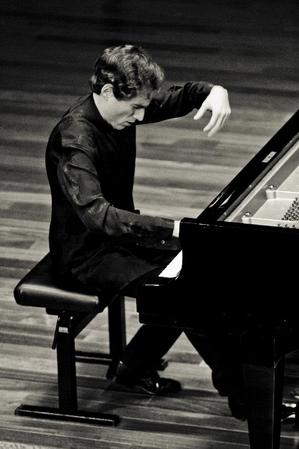ボリス・ギルトブルグ:ファツィオリとスタインウェイに関して
 Boris Giltburg
は好んでFazioliを弾くピアニストの一人ですが、今週FacebookにFazioliとSteinwayに関する自分の考察を掲載しました。
読んだ時にとても感動しましたので、本人の許可を頂いて、和訳と英語の原稿を載せます。
Boris Giltburg
は好んでFazioliを弾くピアニストの一人ですが、今週FacebookにFazioliとSteinwayに関する自分の考察を掲載しました。
読んだ時にとても感動しましたので、本人の許可を頂いて、和訳と英語の原稿を載せます。
===================
今夜マースメヘレン市(注.
ベルギー)のコンサートでFazioliを弾いていて急に「Fazioli はなんて Steinwayと違うのだろう」という思いが頭をよぎった。こんなこ
とを僕が言うと、「それがどうしたの、それこそ、そもそもFazioliが目指したことじゃないかー Steinwayに対する別の選択肢を提供するということを」と言われてしまうだろう。
でも別の選択肢ってそもそも何を意味するのだろうか?今一つのペンで物を書いているとしよう。誰かが別のペンを呉れて、試すようにという。では、誰かが筆
ペンをくれたとしよう。これはより良いか、それとも悪いか?答えはどちらでもない。どちらでも同じ文章が書ける。この文章を構成する文字に変わりはない。
でもそれ以外は違うのである。
手での持ち方、手の動かし方、紙との触れ方、等々・・・・・・そして、もちろん、最終産物である、見た目もかなり違うだろう。
Fazioli ピアノを弾く機会があるたびに、最初の数時間は(無意識に)Steinwayと向き合っている時と同じように向き合っている。でも、それは
絶対に良い結果を生まない。Fazioli はそれに抵抗するのである。僕は、ピアノに強制しようとする。すると出る音は自分が望む音からほど遠くなる。フラストレーションが起こる。僕がFazioli の「Steinwayらしくなさ」を(これもまた無意識に)受け入れた時、つまり二つのピアノの数々の違
いー微妙なものも大きなものもーを受け入れた時、いわば身を任せた時に、初めてFazioliの本当のクオリティーが現れ、あの音、あのカラー、あのニュ
アンス、あのテクスチュア、つまりFazioli 独特の音の世界が広がるのである。
僕がスティーヴン・イッサーリス(注.チェロ演奏家)と一緒に行なったインタビューで、彼は自分の二つの楽器の各々がどの曲に適しているかという話をし
た。でもFazioliとSteinwayの場合はそれは当てはまらないと思う。Fazioli の澄んだ音とアーティキュレーションの容易さの故に、
Fazioli はモーツアルトやバッハを弾くのに素晴らしいという人たちがいる。でも何世紀もの間、優れたバッハやモーツアルトの演奏がSteinway
やBechsteinでされてきた。Fazioliは重厚なロマンティックや20世紀の曲にはパワーに欠けるという人たちがいる。でも自分の個人的な経験
から言うと、リストのロ短調や、プロコフィエフの第8番ソナタやラ・ヴァルス、ラフマニノフの2番などをFazioliで弾いたがパワーは必要以上に十分
であった。
だから、僕はFazioli かSteinwayかという話ではないと思う。今日のプログラムを昨日は良いSteinwayで弾き、今日は良い
Fazioli で弾いた。どちらが好きかと決めることはとても難しいし、どちらも僕にとっては存在して欲しい。二つの経験は本当にかけ離れたもので、それ
ぞれのピアノがコンサートを違う方向へ導いてくれるので、意味ある比較は不可能である。(そして多分これが真の選択肢が真に意味することであろう)。そし
て、同じ曲を弾いた時に、単に新しい深みを発見するだけでなく、色々な点から、新たに解釈し、新たに音を聴くことを可能にしてくれるところが僕が
Fazioli を愛す所以である。
木曜日にはSt. Luke's(注.ロンドン・シンフォニーのホール)で1554(Fazioli製造番号278-1554)を弾くのをとても楽しみにしている。
========================
Boris
の演奏が聴きたいでしょうか?彼のYouTubeチャネルより以下のビデオをお勧めいたします。
(以下は英語の原稿です。)
Playing on a Fazioli tonight in Maasmechelen, something struck me: how *not* like a Steinway a Fazioli is. You might say, what's the big deal, isn't that what Fazioli set out to do - to present an alternative to Steinway?
But what does it really mean, an alternative? It's not like you were writing with a pen, and then somebody gave you a different pen to try out. Imagine you were writing with a pen, and somebody gave you an... ink brush. Is it better? Is it worse? Neither. You can write the same text with both, and the letters which this text is made of will not change. But everything else will: they way you hold it in your hand, the way your hand moves, the way what you write with touches the paper, etc etc etc, and, of course, visually, the end result will be quite different as well.
At each encounter with a Fazioli, I always pass through a period of time, usually a couple of hours, during which I (subconsciously) try to approach it as I would a Steinway, and it never works. The piano resists, I try to force it, the sound is far from what I'd like it to be; frustration ensues. It is only when I (again, subconsciously) accept its un-Steinway-ness, the myriad of things both subtle and big in which the two differ, and, in a way, surrender to it, that the piano begins to show its true qualities and there appear the sound, the colours, the nuances and the textures, in short, the soundscape which is Fazioli's own.
In an interview Steven Isserlis and I gave together, he talked about his two instruments, how each was better suited to different repertoire - but I don't know if this is the case here. I heard people say Fazioli was great for Mozart or Bach because of the clarity and the ease of articulation, but decades of great Bach and Mozart performances have been played on Steinways and Bechsteins. I heard people say that a Fazioli possibly lacked the punch for the heavy Romantic and 20th century music, but, speaking from personal experience, I played Liszt B minor on a Fazioli, and Prokofiev 8th, and La Valse, and Rachmaninov 2, and found in it all the punch I wanted and then some.
So, I think for me it's not about Fazioli vs Steinway. It's about both of them. I played this programme on a good Steinway yesterday, and on a good Fazioli today. I honestly cannot say I prefer the one over the other, and in the end I wouldn't want to be without either. The two experiences were so different, each piano leading the concert into another direction, that no meaningful comparison is possible (which, perhaps, what being a true alternative really means). And I love Fazioli for giving me this opportunity - to be able to play the same pieces of music and not only find new layers in them, but in many ways see and hear them in a new light.
Looking forward to Thursday and to a repeat encounter with the 1554 (Fazioli) at St. Luke's.
カテゴリ

Tel. 03-6809-3534 info@fazioli.co.jp
〒105-0023東京都港区芝浦1-13-10 1F
JR田町駅より徒歩6分/都営三田駅より徒歩8分
ご試弾/カタログのご請求等のお問い合わせ



